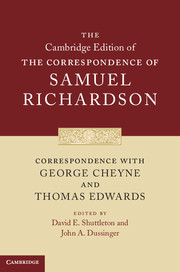General Introduction
Published online by Cambridge University Press: 30 June 2022
Summary
Richardson's correspondence with George Cheyne
The extant correspondence between Samuel Richardson and the physician and medical author George Cheyne (1672–1743) covers an important period in the novelist's life between the mid-1730s, when he is consolidating his reputation as a master-printer, to the spring of 1743 when he is emerging as a literary celebrity after the publication of his first novel Pamela; or Virtue Rewarded (1740). For Cheyne, entering his sixties when this correspondence begins, it represents the final years in a successful, if controversial, medical career. Regrettably what survives is rather one-sided, with eighty-three extant letters from Cheyne being matched by a mere three draft responses from Richardson. Nonetheless, like the correspondence with Aaron Hill, this material provides some of our earliest insights into Richardson's professional and personal life. There is an emphasis upon his precarious health but, as outlined below, Cheyne's letters are not exclusively concerned with medical diagnosis but also address book production and other literary matters. All three of Richardson's replies include important statements concerning his literary values or writing practice. Such concentrated richness is probably a direct outcome of the circumstances in which they have come down to us, for all three are only known as neat drafts which Richardson kept in his personal files and, with an eye on eventual publication, subsequently revised. All three have appeared previously in selected editions of Richardson's letters, but for the present edition I have returned to the original manuscripts now held in London at the Victoria and AlbertMuseum and in New York Public Library.
The letters from Cheyne to Richardson also only survive as a result of the novelist's own desire for their preservation. Within four months of Cheyne's death on 13 April 1743, Richardson had arranged for them to be transcribed into a small octavo copybook of 264 written pages (none of the original letters and no additional letters have come to light). It is hard to ascertain whether the much greater preponderance of letters for the years 1737–43 represents how many were actually written or how many Richardson had kept. The copybook letters are immediately followed by some commemorative poems prompted by Cheyne's death. These are transcribed in the same neat hand that copied the letters.There is also a short memorial notice announcing Cheyne's death composed by Richardson (see Appendix I.2).
- Type
- Chapter
- Information
- Correspondence with George Cheyne and Thomas Edwards , pp. xxxvii - lxxxiiPublisher: Cambridge University PressPrint publication year: 2013



